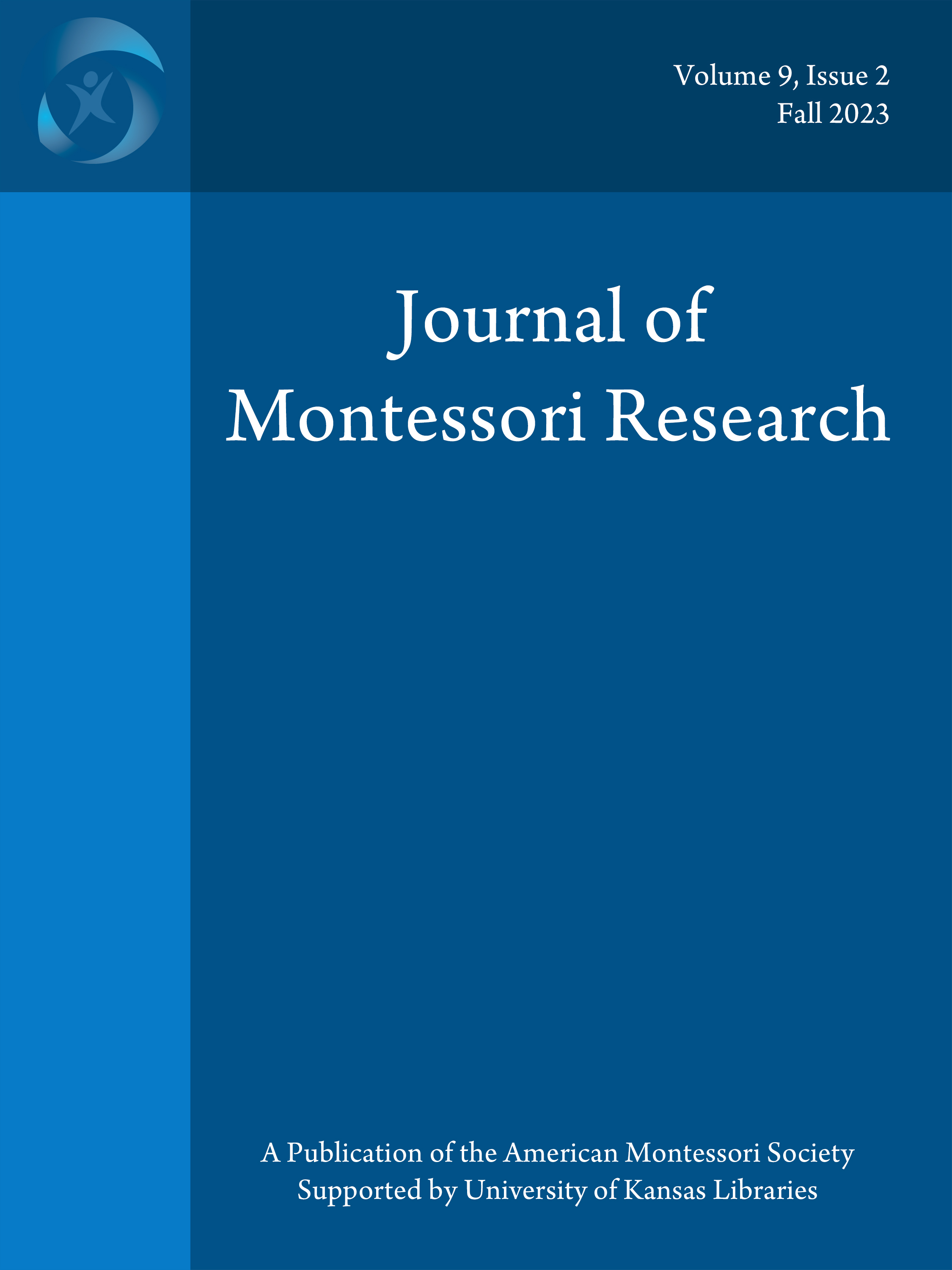Book Review
Powerful Literacy in the Montessori Classroom: Aligning Reading Research and Practice
DOI:
https://doi.org/10.17161/jomr.v9i2.21350Schlagwörter:
Montessori education, science of readingAbstract
A century on, as young children in Montessori classrooms around the world continue to engage with Sandpaper Letters, Metal Insets, Moveable Alphabets, and Reading Command cards, an accumulation of studies into how children learn to read from across a range of
disciplines has generated an influential body of research evidence that has been dubbed the science of reading. The science of reading is currently being used to shape education policy and mandated curriculum documents, especially in the English-speaking world. For this reason, the comparative analysis of the Montessori approach and the science of reading presented in Powerful Literacy in
the Montessori Classroom: Aligning Reading Research and Practice will be welcomed by many Montessori educators.
Literaturhinweise
Barrett, P., Shang, Y., Moffatt, J., & Kobbacy, K. (2013). A holistic multi-level analysis identifying the impact of classroom design on pupils’ learning. Building and Environment, 59, 678–689.
Castles, A., Rastle, K., & Nation, K. (2018). Ending the reading wars: Reading acquisition from novice to expert. Psychological Science in the Public Interest, 19, 5–51. https://doi.org/10.1177/1529100618772271
Culclasure, B., Fleming, D., & Riga, G. (2018). An evaluation of Montessori education in South Carolina’s public schools. The Riley Institute at Furman University.
Dwyer, M. I. (1977). A key to writing and reading for English. Association Montessori Internationale.
Gough, P. B., & Tunmer, W. E. (1986). Decoding, reading, and reading disability. Remedial and Special Education, 7(1), 6–10. 84
Hoover, W. A., & Tunmer, W. E. (2021). The primacy of science in communicating advances in the science of reading. Reading Research Quarterly, 57(2), 399–408. https://doi.org/10.1002/rrq.446
Lillard, A. S. (2012). Preschool children’s development in classic Montessori, supplemented Montessori, and conventional programs. Journal of School Psychology, 50(3), 379–401.
Lillard, A. S., & Heise, M. J. R. (2016). An intervention study: Removing supplemented materials from Montessori classrooms associated with better child outcomes. Journal of Montessori Research, 2(1), 16–26. https://doi.org/10.17161/jomr.v2i1.5678
Lillard, A. S., Heise, M. J. R., Eve, M., Tong, X., Hart, A., & Bray, P. M. (2017). Montessori preschool elevates and equalizes child outcomes: A longitudinal study. Frontiers in Psychology, 8. https://doi.org/10.3389/fpsyg.2017.01783
Montessori, M. (1964). The Montessori Method. Shocken Books. Paris, S. G. (2005). Reinterpreting the development of reading skills. Reading Research Quarterly, 40(2), 184–202.
Scarborough, H. S. (2001). Connecting early language and literacy to later reading (dis)abilities: Evidence, theory, and practice. In S. Neuman & D. Dickinson (Eds.), Handbook for research in early literacy (pp. 97–110). Guilford Press.
Seidenberg, M. S., Borkenhagen, M. C., & Kearns, D. M. (2020). Lost in translation? Challenges in connecting reading science and educational practice. Reading Research Quarterly, 55(S1), S119–S130. https://doi.org/10.1002/rrq.341
Shanahan, T. (2020). What constitutes a science of reading instruction. Reading Research Quarterly, 55(S1), S235–S247. https://doi.org/10.1002/rrq.349
Share, D. L. (2021). Is the science of reading just the science of reading English? Reading Research Quarterly, 56(S1), S391–S402. https://doi.org/10.1002/rrq.401
Thomas, P. (2022). The science of reading movement: The never-ending debate and the need for a different approach to reading instruction. National Education Policy Center. https://nepc.colorado.edu/publication/science-of-reading
Wyse, D., & Bradbury, A. (2022). Reading wars or reading reconciliation? A critical examination of robust research evidence, curriculum policy and teachers’ practices for teaching phonics and reading. Review of Education. https://doi.org/10.1002/rev3.3314
Downloads
Veröffentlicht
Ausgabe
Rubrik
Lizenz
Copyright (c) 2023 Susan Feez

Dieses Werk steht unter der Lizenz Creative Commons Namensnennung - Nicht-kommerziell 4.0 International.


